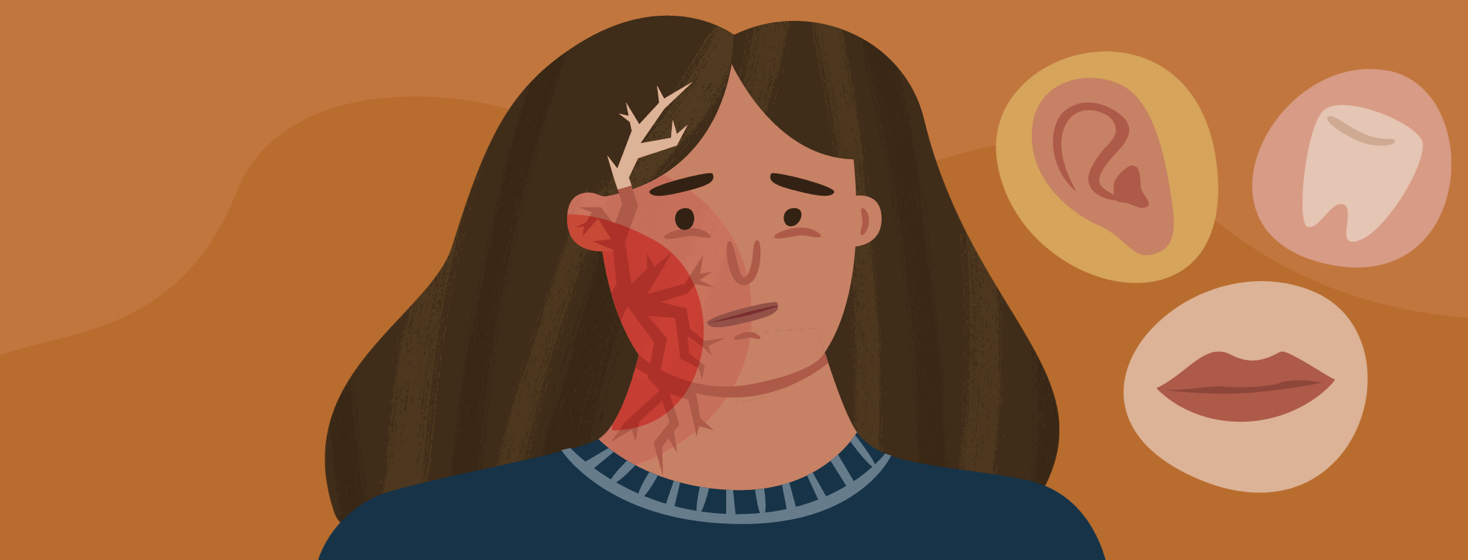What Does the Trigeminal Nerve Have to Do With It?
Whether you have cluster or migraine attacks, you quickly learn they are more than just a headache. One of the many parts of the head that gets triggered during an attack is the trigeminal nerve. It is truly amazing all the anatomy and physiology that I became familiar with!
Migraine, cluster headache, and the trigeminal nerve
Since I have cluster attacks, migraine attacks, and trigeminal neuralgia; I have gotten good at understanding how they interact with each other. Whether you meet the diagnostic criteria for trigeminal neuralgia, understanding the trigeminal nerve will help you understand your symptoms and hopefully help you manage your pain.
What is the trigeminal nerve?
The trigeminal nerve is the 5th and the largest of the cranial nerves. It is a sensory nerve and gets its name because it has 3 divisions or branches on each side. Think of it this way, both cluster and migraine attacks are unilateral - the trigeminal nerve is unilateral! So each of these 3 divisions is on the right side and separately on the left side.
Ophthalmic branch of the trigeminal nerve
- Forehead and scalp
- Upper eyelid cornea
- Bridge and sides of the nose
Maxillary branch of the trigeminal nerve
- Lower eyelid
- Cheeks and maxillary sinus
- Nasal cavity and walls of the nose
- Upper lip
- Upper teeth and gums
- Roof of mouth
Mandibular branch of the trigeminal nerve
- Floor of mouth
- External ear
- Lower lip
- Chin
- Front 2/3 of the tongue
- Lower teeth and gums
What does trigeminal nerve pain feel like?
It is common for someone having a cluster or migraine attack to have associated nerve pain. Sometimes, I experience a shock in my cheek. Other times, I have a more constant aching pain that leads me to think I have something wrong with my teeth or sinuses. More recently, I have felt a shock in my right eye.
Realizing it's a neurological issue
I have visited an ENT for constant sinus pain, a dentist for constant pain in my teeth, and an ophthalmologist for pain felt in my eyes. The more the dentist poked and prodded and attempted to fix a previous cavity that had nothing wrong with the pain, the worse this pain was. Thankfully, in my case, the focus shifted from dental to neurological, before an extraction was performed.
Tooth aches and eye pain
The shock sensation reminds me of the shock felt with static electricity. It can feel like a live wire flailing under my skin. The constant ache is more confusing, especially when it is felt in the teeth or sinus cavity. Hot and cold temperatures trigger my teeth and then my jaw aches. The pain in my eye really feels like something is wrong with my eye. However, the pain is deceptive because it is neurological. Having a tooth pulled will not stop the pain, as the nerve will still continue to send pain signals.
Tearing, drooling, and cluster headache
The trigeminal nerve can also stimulate the parasympathetic autonomic system which is responsible for sending signals to body parts. In the case of the trigeminal nerve, it primarily communicates crying and salivating. When it becomes stimulated abnormally, the eye will tear, droop and redden; while the nose will become congested and discharge. Pain in the teeth can create excess salvia resulting in drooling. This frequently happens in cluster attacks and trigeminal neuralgia but is also known to happen with migraine attacks. Those with episodic cluster may only experience pain in their trigeminal nerve during an episode.
More than one diagnosis
My hope is knowing this information will help you speak to your doctor. The more I have been able to explain my symptoms, the more options my doctor has to help me manage my pain. Also, understanding this information may help your doctor more accurately diagnose you. It is possible to have more than one diagnosis. Each disease presents differently and needs to be managed differently.
Trigeminal neuralgia AND cluster headache
In the case of cluster headaches, there are a number of patients who will qualify also for the diagnostic criteria of trigeminal neuralgia. Under these circumstances, both diagnoses should be made because both must be treated for the patient to manage their conditions. The same would be true of a person with migraine disease.
Have you experienced pain in your trigeminal nerve during a cluster or migraine attack?

Join the conversation